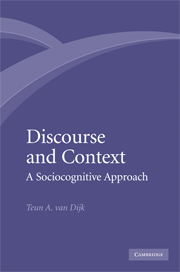1 - Towards a theory of context
Published online by Cambridge University Press: 22 September 2009
Summary
On Tuesday, March 18, 2003, British Prime Minister Tony Blair made a speech in the House of Commons proposing a motion allowing British military action against Iraq "because of its continuing non-compliance with Security Council Resolutions." After reading the motion, he began his speech as follows:
At the outset, I say that it is right that the House debate this issue and pass judgment. That is the democracy that is our right, but that others struggle for in vain. Again, I say that I do not disrespect the views in opposition to mine. This is a tough choice indeed, but it is also a stark one: to stand British troops down now and turn back, or to hold firm to the course that we have set. I believe passionately that we must hold firm to that course. The question most often posed is not "Why does it matter?" but "Why does it matter so much?" Here we are, the Government, with their most serious test, their majority at risk, the first Cabinet resignation over an issue of policy, the main parties internally divided, people who agree on everything else—
[Hon. Members: "The main parties?"]
Ah, yes, of course. The Liberal Democrats—unified, as ever, in opportunism and error.
[Interruption.]
For the Members of Parliament (MPs) present, and for us readers and analysts, to be able to understand this fragment – as transcribed in the official Hansard record – it is obviously crucial to know English grammar and the rules of discourse.
Information
- Type
- Chapter
- Information
- Discourse and ContextA Sociocognitive Approach, pp. 1 - 27Publisher: Cambridge University PressPrint publication year: 2008
